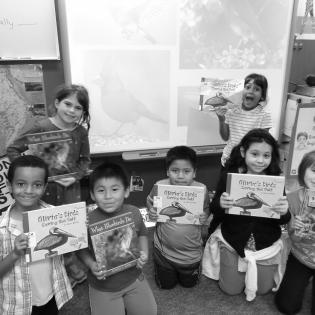Big Words
Children learn about caring and sharing through discussion of the book Martin's Big Words. The lesson introduces the "big" word philanthropy (giving time, talent, and treasure for the common good).
The learner will:
- define philanthropy as giving their time, talent, and/or treasure.
read aloud copy of Martin’s Big Words by Doreen Rappaport
Play a version of "Duck, Duck, Goose." In this version, the player who is IT replaces duck with sharing words (caring, sharing, giving, serving) and the word goose with the word philanthropy. When someone is tapped with the word philanthropy, that person chases the person who is IT. If IT makes it back to sit down without being tagged, he or she shares a reflection (how he or she shared or how he or she feels about sharing acts of kindness). If IT is tagged, the tagger sits down and shares a reflection. The game continues with a new IT. Play until everyone has a chance to reflect.
Instructions
Anticipatory Set:
Say the words stegosaurus, conservation, segregation, and supercalifragilisticexpialidocious! Tell the children that these are really big words and fun to say. Ask whether they know any other really big words. Some words are "big" words because they are very long and hard to pronounce, but other words may be called "big" because they are about big, important ideas. Today they will be hearing a book called Martin’s Big Words, about the life of Civil Rights Leader Martin Luther King, Jr. They will decide if Martin's words are called "big" because they are long words, or because they are about important ideas, or both.
After reading, ask, What did you learn about Martin Luther King, Jr.? How did he help others? Have you ever done something nice or something that helped someone without being asked to do it? Why did you do it, and how did it make you feel? What are some kind things you can do that you don't need permission to do?
Write the word philanthropy and talk about it as the nice or kind things they do for others. Explain that philanthropy means "giving your time, talents, or treasure for the common good."
Give examples of giving time, talent, or treasure: Your family helping a neighbor with yard work was giving their time to help someone. Donating your gently used clothes is an example of giving treasure. Writing a poem for your aging grandma when she isn't feeling well is an example of sharing your talent for the good of another.
In the book Martin's Big Words, they learned how one person can make a difference. What are some ways we can make a difference with our time, talent, or treasure?
Philanthropy Framework
-
Strand PHIL.I Definitions of Philanthropy
-
Standard DP 01. Define Philanthropy
-
Benchmark E.1 Define philanthropy as the giving and sharing of time, talent, or treasure intended for the common good.
-
-
-
Strand PHIL.II Philanthropy and Civil Society
-
Standard PCS 02. Diverse Cultures
-
Benchmark E.1 Give examples of philanthropic traditions of diverse cultures.
-
Benchmark E.4 Demonstrate listening skills.
-
-
Standard PCS 05. Philanthropy and Government
-
Benchmark E.10 Give an example of an action by an individual or a private organization that has helped to enhance a fundamental democratic principle.
-
Benchmark E.9 Describe how philanthropic activities can bring about social change.
-
-
Standard PCS 06. Philanthropy in History
-
Benchmark E.1 Give an example of philanthropic action that influenced the history of the state or region.
-
Benchmark E.2 Give an example of an individual who used social action to remedy an unjust condition.
-
Benchmark E.5 Identify positive philanthropic historic acts or events that helped build the community, state, and nation.
-
-
-
Strand PHIL.III Philanthropy and the Individual
-
Standard PI 01. Reasons for Individual Philanthropy
-
Benchmark E.10 Identify reasons why historic figures acted for the common good.
-
Benchmark E.4 Give an example of how citizens act for the common good.
-
-
